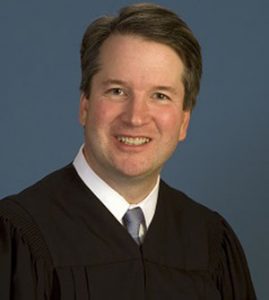
Wikimedia Commons photo
The announcement of Brett Kavanaugh as President Donald Trump’s nominee for the U.S. Supreme Court cheered many Christians and conservatives July 9, including a coalition of evangelical leaders who released a statement in support of the 53-year-old federal appeals court judge.
“Judge Kavanaugh is an outstanding choice for the Supreme Court,” tweeted Ethics and Religious Liberty Commission President Russell Moore. “He has a strong record, and the Senate should confirm him without delay.”
Moore was one of 40 leaders who signed the statement calling for Kavanaugh’s quick confirmation. The nomination was met with criticism from many on the left, including several Democratic Senators who signaled they’ll fight his confirmation. Appointing Kavanaugh will require a simple majority in the U.S. Senate; Republicans currently hold a 51-49 majority.
The nomination came two weeks after Associate Justice Anthony Kennedy announced his retirement. Kavanaugh, who served as an aide to President George W. Bush, is viewed as more conservative than Kennedy, who often served as a swing vote on the Court. He authored the opinion in the Obergefell vs. Hodges in 2015, which legalized same-sex marriage in the U.S.
Kennedy also agreed with the Court’s opinion in a 1992 ruling, Planned Parenthood v. Casey, which reaffirmed Roe v. Wade. The landmark 1973 decision to lift state restrictions on abortion figured prominently into discussion about Kavanaugh’s nomination. While the judge himself testified in 2006 that he would follow Roe “faithfully and fully” as the “binding precedent of the court,” he declined give his personal opinion of the ruling.
During his presidential campaign, Trump pledged to nominate conservative justices who could overturn Roe, a promise his supporters still see as a possibility—one made even more likely by a second conservative appointment to the Supreme Court.
“I think eventually a conservative court will either overturn Roe v. Wade or at least greatly diminish its importance and its power,” Dallas pastor Robert Jeffress told Fox News before the nomination announcement.
Kavanaugh’s D.C. court decided last year that an undocumented minor could have an abortion, an opinion from which he dissented by stating that she shouldn’t be able to receive an abortion “on demand.” The stance was seen by some pro-life advocates as not strong enough.
Also pressing for evangelicals is Kavanaugh’s record on religious liberty, particularly in light of several high-profile cases heard by the Court during their most recent session. Christianity Today called Kavanaugh “another religious liberty defender,” referencing recent appointee Neil Gorsuch, whose pre-appointment resume included supporting Hobby Lobby’s right to be exempt from providing contraceptives in employee insurance plans.
While on the D.C. Appeals Court in 2015, Kavanaugh, a Roman Catholic, dissented from the court’s opinion not to rehear a challenge to the mandate, this one from the non-profit Priests for Life. He also issued an opinion in 2010 supporting the constitutionality of prayer at the presidential inauguration, and the words “so help me God” in the presidential oath.
During the session that ended June 27, justices ruled on Masterpiece Cakeshop v. Colorado, in which they found in favor of a baker penalized by a state commission for refusing to create a cake for a same-sex wedding ceremony. They also instructed the Washington Supreme Court to reconsider the case of a florist similarly penalized, in light of the Masterpiece ruling.
Moore referenced those rulings and others in his statement supporting Kavanaugh. “As we saw this past term… the Supreme Court plays a vitally important role in protecting the dignity of every life and religious freedom for all Americans.
“Judge Kavanaugh is an outstanding choice for a Supreme Court justice. He will interpret the Constitution, not attempt to create laws from the bench.”
-Meredith Flynn, with reporting by Baptist Press and Christianity Today

